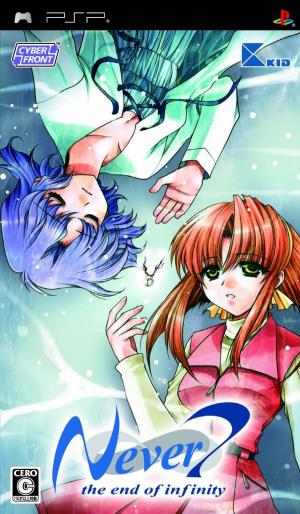

Platform: Sony Playstation Portable
Region: Region Not Set
Developer(s): KID Corp.
Publishers(s): KID Corp.
ReleaseDate: 2009-03-12
Players: 1
Co-op: No
Never7 The End of Infinity (JPN)
Never 7: The End of Infinity is a visual novel video game developed by KID. It was originally published by KID on March 23, 2000, for the PlayStation under the name Infinity, and has since been released on multiple platforms. The game is the first title in the Infinity series, and is followed by Ever 17: The Out of Infinity, Remember 11: The Age of Infinity, 12Riven: The Psi-Climinal of Integral, and Code_18. In the game, the player takes the role of Makoto Ishihara, a college student who attends a seminar camp on an island together with three other students; he also befriends three other people whom he meets on the island. The game takes place over the course of a week, and consists of the player reading the story, occasionally making choices that affect the direction of the plot; on the sixth day, one of the female characters dies, and the game moves back in time to the beginning, letting the player use knowledge from the first set of six days to make new choices, to try to prevent the character's death. The game was directed by Takumi Nakazawa, planned and written by Kotaro Uchikoshi, and composed for by Takeshi Abo. Uchikoshi included science fiction elements in the game, but was unable to make heavy use of use them, as his superiors at KID thought that the game needed to focus on cute female characters in order to sell. Abo composed music based on his first impressions of reading the game's story, with a focus on its "emotional flow". Because of the science fiction and theoretical themes, he composed "geometric music". A reviewer at RPGFan praised the game for its plot, its intimate scope, and its music, while a writer for Famitsu found the game's mood to be boring. As the science fiction elements were well received, later entries in the series gradually moved away from the dating theme and became more focused on science fiction. The PlayStation Portable version of the game was the 967th best selling video game of the year in Japan in 2009. Never 7 is a visual novel[1] in which the player reads the story, and presses a button to advance through the text. At certain points, the player gets to make choices which affect the direction the plot proceeds in; these involve choosing what location to move to, and what the player character should say, as well as subtler choices such as whether to look a girl in the eyes or to take her hand. The game is presented from a first-person perspective, with pre-rendered backgrounds and 2D character portraits accompanying the text. The visuals mostly consist of still images, but with characters often changing their expression while talking.[2] After six days have passed in the game's story, the game moves back in time to the beginning, allowing the player to make new choices based on the knowledge they have gained through the first six days to try to prevent certain events. Depending on the choices the player makes, the game either ends on a "bad ending" on the sixth day, or continues into a "good ending" on the seventh day. After finishing the game, a picture gallery and a music test are made available in an omake mode. When replaying parts of the game, the player is able to use a fast forward function to move past sections of text that they have already read. The game also includes an "Append Story" mode in which the player can play new scenarios that are downloaded from the developer's website.[2] In the Dreamcast version of the game, a meter on the system's Visual Memory Unit shows how the player is doing with the female characters: it shows three blocks, which have hearts inside if the player is doing well.[2] In the PlayStation Portable version, the player has access to a glossary, which explains various key words used in the game.[3] In the Android version, the player gets points throughout the game, which can be used to unlock applications such as a calculator, a calendar, and mini-games.[4]
ESRB Rating: T - Teen
Genre(s): Adventure